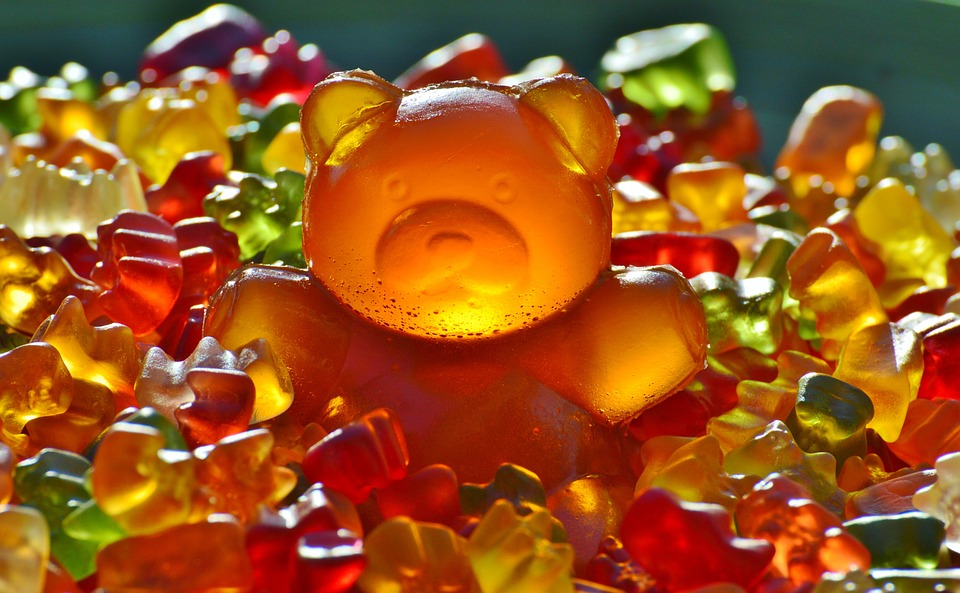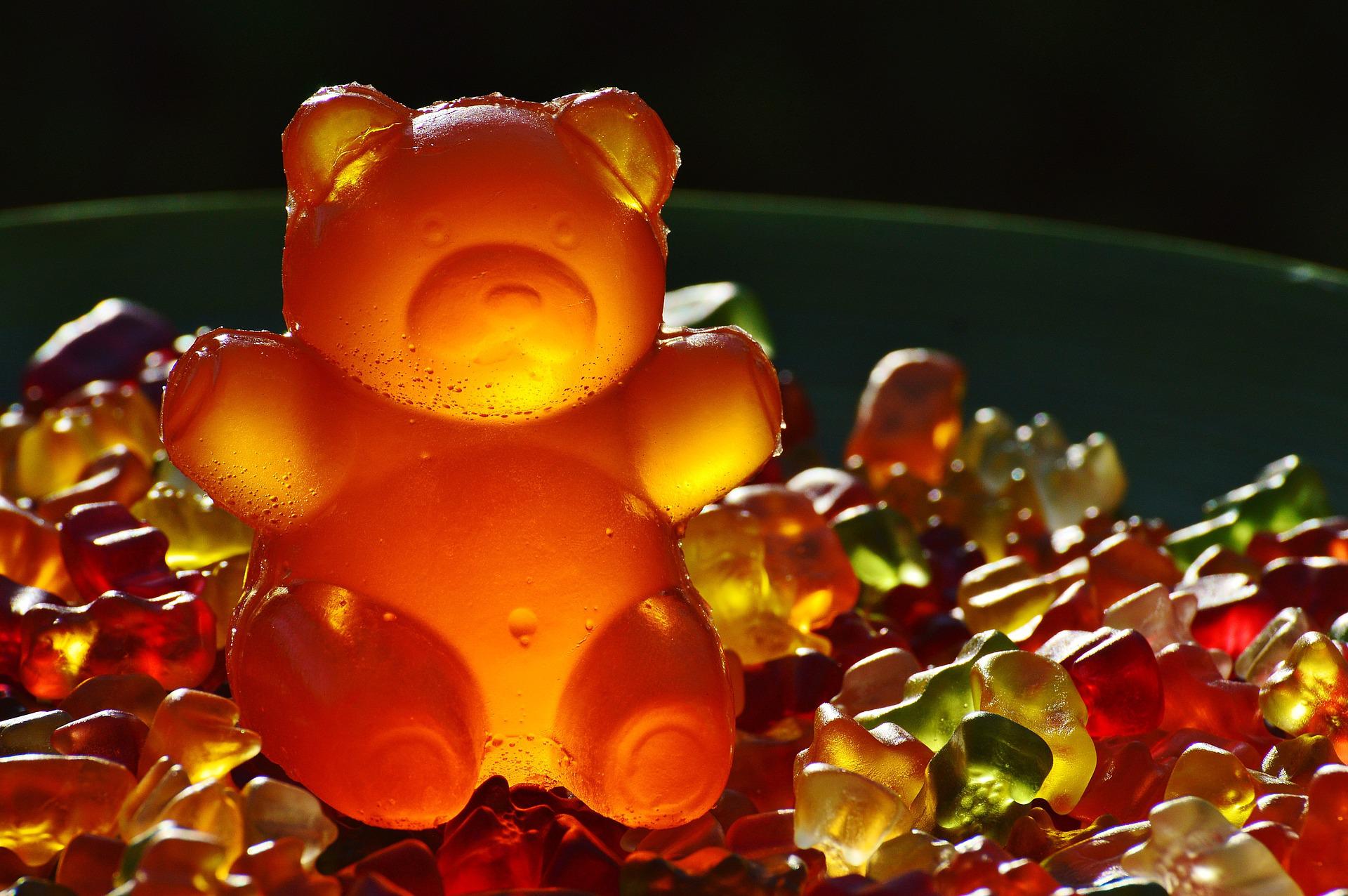Can Vegans Eat Gummy Bears?

Gummy bears are chewy, multicolored sweet treats that come in a range of fruit tastes such as banana, strawberry, and numerous other flavors. But can vegans eat gummy bears?
The majority of gummy bears are sweet, and some are sour which is popular with both adults and children all over the world. These scrumptious treats have been around for a long time. It is a simple snack to pack and take with you.
Gummy bears come in a variety of flavors. These bear-shaped treats come in a rainbow of vivid hues, including red, green, orange, and brown. These small bears are a hit with everyone as a quick sugary treat.
However, gelatin (which comes from the bones, hooves, and skin of slaughtered pigs and other animals) is present in most gummy bears, making them not vegan-friendly. To put it another way, the majority of gummy bears are neither vegan nor vegetarian.
Are Gummy Bears Vegan?
Most gummy bears are not vegan because they contain some animal-derived ingredients. But there are some guilt-free alternatives for vegans. While vegan gummy bear options may be tough to locate in your local grocery store, there is no better place to look for them than online.
When purchasing make sure to read the ingredients list and research the gummy bear brand in order to stay on the safe side.
Traditional gummy bears include gelatin which is a byproduct of cows and pigs. Additionally, it acts as a thickening ingredient to keep them from breaking apart. Because gelatin is an animal byproduct, most gummy bears are neither vegan nor vegetarian.
What are the Ingredients in Gummy Bears?

Gummy bears are extremely popular and there are gummies in almost every shape you can think of. Regular gummy bears contain substances that are not vegan, so you need to be aware of which ingredients to avoid while looking for a vegan substitute.
Below are the non-vegan ingredients in gummy bears to stay away from:
Artificial Colors
According to PETA, some artificial colors are a by-product of animal experiments. While these components are vegan at their core, it is worth noting that some of the colors such as Red 40 have been tested on animals to avoid potential health hazards in humans.
Beeswax
Beeswax is used as a coating in gummy bears to keep the sweets from clinging to each other.
Furthermore, beeswax is a naturally occurring wax generated by honey bees for the purpose of constructing honeycombs, a structure that aids in storing honey and protecting younger bees.
Some vegans think that honey and beeswax may both be vegan if no bees are harmed and enough honey is left for the bees to survive. To put it another way, these elements must be obtained through ethical beekeeping, which is a concept that most vegans despise.
Cane Sugar
Sugarcane or sugar beets provide refined sugar for most sweet products. The flavor and texture are the same regardless of whatever variety is in use. However, the refining methods are different.

For instance, beet sugar is crystallized after passing through a diffuser and being blended with non-animal additives. However, the process of making cane sugar determines its vegan status. While these kinds have the same flavor and texture, they have distinct refining procedures.
If you are unfamiliar with bone char, it is a charcoal-like powder created by roasting cow bones at high temperatures.
A new trend is emerging in which more providers are depending on alternatives such as activated carbon and ion-exchange resins to accomplish the same outcome.
Unfortunately, some sugar producers utilize bone char to process, filter, and bleach sugar, which is one of the reasons why cane sugar has such a clean, white appearance.
Gelatin
Sugar, corn syrup, water, coloring, and flavorings are used to manufacture gummy bears, but gelatin is what completes a gummy bear. Most gummy bears include gelatin, which is manufactured from slaughtered animal cartilage, bones, skin, and hooves, among other things.
Gelatin is primarily responsible for the candy’s distinct gummy features. When put in water, this protein made from animal tissue creates thick solutions or gels. The gels take on the texture of chewy, gummy candy when administered at the right dosage.
It consists of meat industry scraps, and it commonly includes elements like hooves, skin, crushed bones, and even connective tissue.
Are Gummy Bears Gelatin-Free?
No, gummy bears are not gelatin-free. Many gummy bear companies utilize animal-derived gelatin in their products, making it a treat not suitable for vegans.
Animal collagen, a protein found in connective tissues such as skin, tendons, ligaments, and bones, makes up gelatin.
Furthermore, the skins and bones of some animals, most often cows and pigs, are boiled, dried, treated with a strong acid or base, and then filtered to remove the collagen.
Are Vegan Gummy Bears Healthy?

Vegan gummy bears consist of organic or all-natural ingredients. They are low in sugar and calories, yet abundant in vitamins and minerals.
Moreover, vegan gummies have the same sweet and salty flavor individuals enjoy without the risk of an imbalance in diet or bad health consequences.
It contains fewer calories than chocolate, sour candies, and hard candies since it consists entirely of natural and organic components. Vegans may find that gummies are an excellent method to receive the nutrients they require.
Wrap Up
The majority of traditional gummy bears you will find in the supermarket are not vegan, as they typically include beeswax, gelatin, or other non-vegan ingredients.
The good news is that many non-vegan companies are adapting their business models and employing vegan substitutes. Gummy bears have been a popular childhood delight for decades, and many of us have fond memories of eating them.
Regular gummy bears are not vegan-friendly. Hence, it is important to check the ingredients list of every gummy bear brand you decide to purchase.
On the other hand, there are some vegan gummy bear alternatives available. Vegan gummy bears are a delicious way to enjoy these delicious snacks. They are an excellent on-the-go snack, especially for kids.











